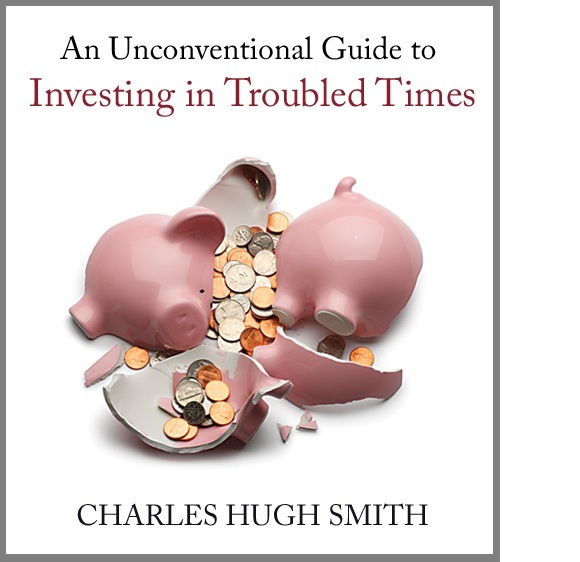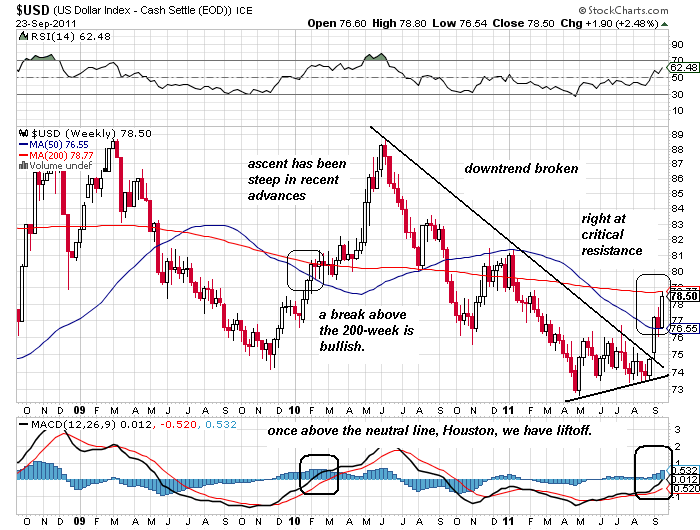The Risks of Forecasting
Our instinct is to select a forecast as our own, and then defend it. This can be a disastrous investment strategy. Longtime correspondent R.S.D. recently suggested I update the 5-year scenario I laid out on February 15, A 5-Year Scenario: 2011-2016. That is an excellent suggestion and I will attempt to do so. But first we need to examine the intrinsic risks of forecasting. I have no idea if the predictions in that entry qualify as accurate or not, but we are still in the first inning of the first phase, and predicting the outcome of the 9th inning, much less the game, is impossible. I am much less confident of forecasts and predictions than most of my blogging peers or the Wall Street analysts who churn out reams of analyses daily or weekly, little of which proves either accurate or useful in terms of dodging losses and downturns. I have no more faith in my own forecasts as anyone else's, and this reflects my belief that history rarely follows the expected paths. As I have often noted here and in my new book, An Unconventional Guide to Investing in Troubled Times humans are wired to feel uncomfortable with uncertainty and contingency, and so we gravitate to a position after a short time even if we have no new information. Once we have (often unconsciously) defaulted to a position that aligns with our ideological leanings, then we are wired to cling to it, a predisposition that is visible in confirmation bias, our tendency to select data which confirms our pre-selected position. Clearly, these two traits of the human mind are potentially disastrous for investors. There are lots of explanations out there for why so few people actually beat the market over both bull and bear markets-- numerous studies have found the actual number is essentially statistical noise--we might start with these two traits: extreme discomfort with uncertainty and indecision, and a powerful urge to defend rather than abandon a position once taken. Readers of this blog know that I truly have no alignment with either "Liberal" or "Conservative" political ideologies, for the obvious reason that "liberal" and "conservative" are merely marketing terms designed to distract us from the fact that both parties are beholden/captured by the same Plutocracy/Oligarchy of Central State fiefdoms and crony/cartel Capitalism concentrations of wealth. Despite the painful obviousness of this fact, the vast majority of Americans still cling to one ideology or the other, as if the travesty of a mockery of a sham "parties" have any value or "solutions" other than bamboozling citizens into looking the other way as they go about their job of funneling the plunder and power to various Elites and cartels. In a similar fashion, the vast majority of investors seek the psychological safe haven of one forecast or another: hyper-inflation, deflation, stagflation, biflation, sideways markets, you name it. Our desire to nail down a forecast which will guide our investment decisions is entirely natural, as is our vociferous defense of that position once we have embraced it. I have poked around all these basic forecasts for six years, and have always ended up dissatisfied with all of them, even as I have described the compelling features of various positions. Proponents of each position, however, brook no dissent with their chosen forecast, and any doubters are quickly attacked as heretics. I have described this quasi-religious devotion to one position or another many times, and have often referred to Keynesianism and the Fed as cargo cults based on nonsensical belief systems which ultimately distill down to magical incantations such as "animal spirits" or "don't fight the Fed." Anyone who remains unattached to one forecast or another is like the blindfolded heretic in a circular firing squad: after the bullets fly, the heretic finds himself unharmed while the circular firing squad eliminated itself. In writing my book this year, I finally came to understand the consequences of this overwhelming drive within us to latch onto one forecast or another. If we combine this understanding with a grasp of complex non-linear systems, and how they can destabilize or enter a chaotic phase shift when parameters are changed, then we philosophically become more attuned to a state of permanent contingency, in which all forecasts are viewed as thought experiments rather than ideologies. The human mind rebels against an embrace of permanent contingency on two fronts, internally and externally. Internally, we tire of indecision and uncertainty, and externally, we feel a great need to defend our position by attacking heretics and disbelievers. Each forecast is defended by what amounts to an Inquisition, because unbelievers and heretics threaten all forecasting cults with doubt: what if my chosen position is wrong? That possibility is more fearful to the human mind than losing money. Thus we see one camp after another ground up by market gyrations which they have zealously claimed are impossible, or even "proven" are impossible, even as events have overtaken their forecast. In the middle of an uptrend, then extending that uptrend to the sky becomes not just plausible but even "likely," hence the calls for Apple to become the first $1,000 per share company, the glowing forecasts for Netflix's permanent growth, and so on. Favored explanations of busted forecasts and failure of various cargo cults include manipulation (a real force, to be sure, but also an all-too-handy scapegoat for being wrong) and market instability. very rarely does one hear "my forecast was wrong, I'm changing it." Why? There is also an element of human pride at work. We are all ready to describe our brilliant 10-bagger trade, but circumspect about our losses. As I note in my new book, if you double your investment with each trade (not that difficult with options or futures contracts), it only takes 11 trades (or 18 hedged trades) to turn $500 into $1,000,000 (see page 63). If a forecast was highly accurate, how difficult would it be to align 11 good trades in a row? The reality is that very few traders turn $500 into $1,000,000, and if they accomplished that, then they could go on with their forecast/system and turn the $1 million into $500 million, and so on. (Note: the larger the position, the more difficult it is to find opportunities of sufficient size and liquidity. Thus the "hot" manager tends to become less hot once the fund grows to the $1 billion and above in size.) All of this is to say that any "forecast" I might make here is only a thought experiment which takes certain dynamics of a highly complex non-linear system and ponders the probabilities of how they might interact. A thought experiment can be dropped or revised if it is inaccurate or misleading, but an ideologically based forecast must be defended against all doubters and heretics. That's why it's important to make the distinction between the two: a thought experiment is founded on adaptability, flexibility, contingency and skepticism, all the traits which I expect will continue to have value regardless of how the next decade plays out. I tend to rely more on charts than on ideology, as the charts are reflections of behavior not belief. Thus I have continued to describe the possibility that the U.S. dollar would gain (as reflected in the DXY index) since April/May. Simply discussing this possibility led me to be vilified as a "danger" to my readers. ("Heretical" thought is intrinsically "dangerous" to orthodoxies of all stripes and flavors.) This possibility has taken months to play out, and it is still playing out in an unpredictable fashion. Nobody knows how high the DXY might go in the next four months, much less the next four years. All we can say with some certainty is the idea that the DXY might rise in a sustained fashion is generally disbelieved as "possible," and the notion has more skeptics than believers. All of this is necessary preface to any updating of the February 2011 "forecast," for everything is contingent and subject to change. The more system dynamics are repressed, the more likely it becomes that "improbable" events occur and "highly probable" trends dissolve or reverse. That's the world we live in: the Status Quo forces are attempting to control and suppress dynamics beyond the control of policy and intervention. Their intervention and perception management simply raise the probabilities of "improbable" events occurring. That's another good reason to keep a light touch on the "forecast" button. If this recession strikes you as different from previous downturns, you might be interested in my new book An Unconventional Guide to Investing in Troubled Times (print edition) or Kindle ebook format. You can read the ebook on any computer, smart phone, iPad, etc.Click here for links to Kindle apps and Chapter One. The solution in one word: Localism. Order Survival+: Structuring Prosperity for Yourself and the Nation (free bits) (Mobi ebook) (Kindle) or Survival+ The Primer (Kindle) or Weblogs & New Media: Marketing in Crisis (free bits) (Kindle) or from your local bookseller. Of Two Minds Kindle edition: Of Two Minds blog-Kindle
Readers forum: DailyJava.net.
My new book is available in both print and ebook formats: An Unconventional Guide to Investing in Troubled Times (print edition) or Kindle ebook format. You can read the ebook now on any computer, smart phone, iPad, etc. Click here for links to Kindle apps and Chapter One.Thank you, Dipti M. ($25), for your wondrously generous contribution to this site -- I am greatly honored by your support and readership. Thank you, Amaze Productions ($20), for your unstintingly generous contribution to this site -- I am greatly honored by your ongoing support and readership.

























